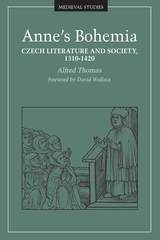

Bringing together Czech fiction published by women between 1890 and 1910, Beyond the World of Men presents works that confront pivotal issues of the time, including the “woman question” and women’s rights, class conflict, lesbian love, and the relationship between the aristocracy and the Czech peasantry (as in two stories originally written in German by the aristocrat Marie von Ebner-Eschenbach). The collection contains stories that are of literary merit, but also hold historical value. In these works, the authors offer trenchant social commentary while injecting both comic and sentimental elements into their writing, employing humanity and subtlety.
As a whole, the collection suggests a revision of the critical understanding of Czech literary modernism; these writers represent voices that were not usually heard in the male writing of the period. They also demand evaluation in their differing (but constant) reactions to earlier women’s writing in Czech and in other European languages, but particularly that of the central figure of Božena Nemcová, to whose canonic novel Babicka they constantly return.
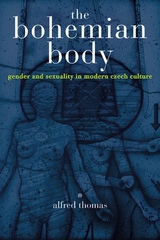
By re-examining the work of key Czech male and female writers and poets from the National Revival to the Velvet Revolution, Alfred Thomas exposes the tendency of Czech literary criticism to separate the political and the personal in modern Czech culture. He points instead to the complex interplay of the political and the personal across ethnic, cultural, and intellectual lines and within the works of such individual writers as Karel Hynek Mácha, Bozena Nemcová, and Rainer Maria Rilke, resulting in the emergence and evolution of a protean modern identity. The product is a seemingly paradoxical yet nuanced understanding of Czech culture (including literature, opera, and film), long overlooked or misunderstood by Western scholars.
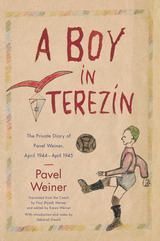
The Germans claimed that Theresienstadt was "the town the Führer gave the Jews," and they temporarily transformed it into a Potemkin village for an International Red Cross visit in June 1944, the only Nazi camp opened to outsiders. But the Germans lied. Theresienstadt was a holding pen for Jews to be shipped east to annihilation camps.
While famous and infamous figures and historical events flit across the pages, they form the background for Pavel's life. Assigned to the now-famous Czech boys' home, L417, Pavel served as editor of the magazine Ne?ar. Relationships, sports, the quest for food, and a determination to continue their education dominate the boys' lives. Pavel's father and brother were deported in September 1944; he turned thirteen (the age for his bar mitzvah) in November of that year, and he grew in his ability to express his observations and reflect on them. A Boy in Terezín registers the young boy's insights, hopes, and fears and recounts a passage into maturity during the most horrifying of times.

A fictional return to the unsettling world of Franz Kafka’s iconic unfinished novel, The Castle
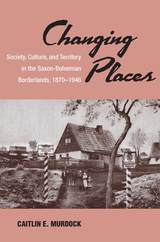
"Changing Places is an interesting meditation on the varying identities and rights claimed by residents of borderlands, the limits placed on the capacities of nation-states to police their borders and enforce national identities, and the persistence of such contact zones in the past and present. It is an extremely well-written and engaging study, and an absolute pleasure to read."
---Dennis Sweeney, University of Alberta
"Changing Places offers a brilliantly transnational approach to its subject, the kind that historians perennially demand of themselves but almost never accomplish in practice."
---Pieter M. Judson, Swarthmore College
Changing Places is a transnational history of the birth, life, and death of a modern borderland and of frontier peoples' changing relationships to nations, states, and territorial belonging. The cross-border region between Germany and Habsburg Austria---and after 1918 between Germany and Czechoslovakia---became an international showcase for modern state building, nationalist agitation, and local pragmatism after World War I, in the 1930s, and again after 1945.
Caitlin Murdock uses wide-ranging archival and published sources from Germany and the Czech Republic to tell a truly transnational story of how state, regional, and local historical actors created, and eventually destroyed, a cross-border region. Changing Places demonstrates the persistence of national fluidity, ambiguity, and ambivalence in Germany long after unification and even under fascism. It shows how the 1938 Nazi annexation of the Czechoslovak "Sudetenland" became imaginable to local actors and political leaders alike. At the same time, it illustrates that the Czech-German nationalist conflict and Hitler's Anschluss are only a small part of the larger, more complex borderland story that continues to shape local identities and international politics today.
Caitlin E. Murdock is Associate Professor of History at California State University, Long Beach.
Jacket Credit: Cover art courtesy of the author
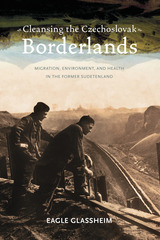
Prior to their expulsion in 1945, ethnic Germans had inhabited the Sudeten borderlands for hundreds of years, with deeply rooted local cultures and close, if sometimes tense, ties with Bohemia’s Czech majority. Cynically, if largely willingly, harnessed by Hitler in 1938 to his pursuit of a Greater Germany, the Sudetenland’s three million Germans became the focus of Czech authorities in their retributive efforts to remove an alien ethnic element from the body politic—and claim the spoils of this coal-rich, industrialized area. Yet, as Glassheim reveals, socialist efforts to create a modern utopia in the newly resettled “frontier” territories proved exceedingly difficult. Many borderland regions remained sparsely populated, peppered with dilapidated and abandoned houses, and hobbled by decaying infrastructure. In the more densely populated northern districts, coalmines, chemical works, and power plants scarred the land and spewed toxic gases into the air. What once was a diverse religious, cultural, economic, and linguistic “contact zone,” became, according to many observers, a scarred wasteland, both physically and psychologically.
Glassheim offers new perspectives on the struggles of reclaiming ethnically cleansed lands in light of utopian dreams and dystopian realities—brought on by the uprooting of cultures, the loss of communities, and the industrial degradation of a once-thriving region. To Glassheim, the lessons drawn from the Sudetenland speak to the deep social traumas and environmental pathologies wrought by both ethnic cleansing and state-sponsored modernization processes that accelerated across Europe as a result of the great wars of the twentieth century.
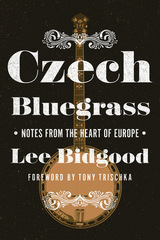
Lee Bidgood offers a fascinating study of the Czech bluegrass phenomenon that merges intimate immersion in the music with on-the-ground fieldwork informed by his life as a working musician. Drawing on his own close personal and professional interactions, Bidgood charts how Czech bluegrass put down roots and looks at its performance as a uniquely Czech musical practice. He also reflects on “Americanist” musical projects and the ways Czech musicians use them to construct personal and social identities. Bidgood sees these acts of construction as a response to the Czech Republic’s postsocialist environment but also to US cultural prominence within our global mediascape.
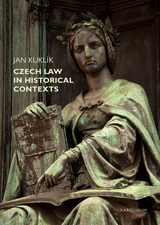
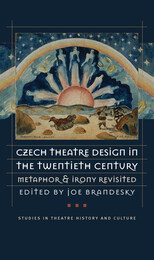
Essays by Vera Ptacková, Dennis Christilles, Delbert Unruh, and, Marie Zdenková their full texts restored and reedited for this volume since their initial publication in exhibit catalogs, provide historical and linguistic insights into contemporary Czech scenography as well as comparisons to the major art movements affecting the designers. Brandesky’s informative introductory essay contextualizes the shifting tenets of Czech theatre design. Also included are biographies of the designers, a bibliography, and thirty black-and-white photographs.
The accompanying CD provides access to the vibrant and sophisticated images of the Czech theatrical world: 138 richly colorful paintings and drawings of costumes, models, and set designs and in situ photos of exhibited designs plus 27 color and black-and-white photos of the designers. The CD also includes the full text of the book with links to all the art and to the designers’ biographies. Book and CD together showcase the Czech Republic as a center of international stage design.
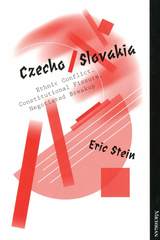
For more than three years after the implosion of the Communist regime in 1989, the Czechs and Slovaks negotiated the terms of a new relationship to succeed the centralized federation created under communism. After failing to agree to the terms of a new union, the parties agreed on an orderly breakup.
In the background of the narrative loom general issues such as: What are the sources of ethnic conflict and what is the impact of nationalism? Why do ethnic groups choose secession and what makes for peaceful rather than violent separation? What factors influence the course of postcommunist constitutional negotiations, which are inevitably conducted in the context of institutional and societal transformation? The author explores these issues and the reasons for the breakup.
Eric Stein, a well-known scholar of comparative law and a native of Czechoslovakia, was invited by the Czechoslovak government to assist in the drafting of a new constitution. This book is based on his experiences during years of work on these negotiations as well as extensive interviews with political figures, journalists, and academics and extensive research in the primary documents. It will appeal to historians, lawyers, and social scientists interested in the process of transformation in Eastern Europe and the study of ethnic conflict, as well as the general reader interested in modern European history.
Eric Stein is Hessel E. Yntema Professor Emeritus, University of Michigan Law School. He previously served with the United States Department of State in the Legal Advisor's Office. He is the author of many books and articles on comparative law and the law of the European Community.
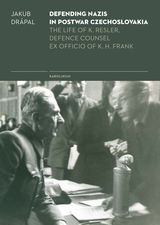
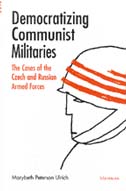
In a groundbreaking study, Marybeth Peterson Ulrich explores the attitudes of the leaders of the armed forces in Russia and the Czech Republic toward the new democratic governments and suggests ways in which we might encourage the development of politically neutral militaries in these states. Building on the work of Samuel Huntington and others on the relationship between the military and the state, the author suggests that norms of military professionalism must change if the armies in countries making a transition from communist rule are to become strong supporters of the democratic state. The Czech Republic and Russia are interesting cases, because they have had very different experiences in the transition; they have different geopolitical goals; and they experienced different military-civilian relationships during the Soviet period. The author also explores American and NATO programs to promote democratization in these militaries and suggests changes in the programs.
Marybeth Peterson Ulrich is Associate Professor of Government, U.S. Army War College.
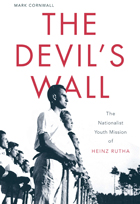
Legend has it that twenty miles of volcanic rock rising through the landscape of northern Bohemia was the work of the devil, who separated the warring Czechs and Germans by building a wall. The nineteenth-century invention of the Devil’s Wall was evidence of rising ethnic tensions. In interwar Czechoslovakia, Sudeten German nationalists conceived a radical mission to try to restore German influence across the region. Mark Cornwall tells the story of Heinz Rutha, an internationally recognized figure in his day, who was the pioneer of a youth movement that emphasized male bonding in its quest to reassert German dominance over Czech space.
Through a narrative that unravels the threads of Rutha’s own repressed sexuality, Cornwall shows how Czech authorities misinterpreted Rutha’s mission as sexual deviance and in 1937 charged him with corrupting adolescents. The resulting scandal led to Rutha’s imprisonment, suicide, and excommunication from the nationalist cause he had devoted his life to furthering. Cornwall is the first historian to tackle the long-taboo subject of how youth, homosexuality, and nationalism intersected in a fascist environment. The Devil’s Wall also challenges the notion that all Sudeten German nationalists were Nazis, and supplies a fresh explanation for Britain’s appeasement of Hitler, showing why the British might justifiably have supported the 1930s Sudeten German cause. In this readable biography of an ardent German Bohemian who participated as perpetrator, witness, and victim, Cornwall radically reassesses the Czech-German struggle of early twentieth-century Europe.
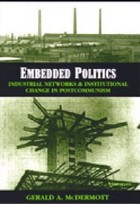
Using comparative case analysis of several manufacturing sectors, Embedded Politics accounts for change and continuity in the formation of new economic governance institutions in the Czech Republic. It analytically links the macropolitics of state policy with the micropolitics of industrial restructuring. Thus the book advances an alternative approach for the comparative study of institutional change and industrial adjustment.
As a historical and contemporary analysis of Czech firms and public institutions, this book will command the attention of students of postcommunist reforms, privatization, and political-economic transitions in general. But also given its interdisciplinary approach and detailed empirical analysis of policy-making and firm behavior, Embedded Politics is a must read for scholars of politics, economics, sociology, political economy, business organization, and public policy.
Gerald A. McDermott is Assistant Professor of Management in The Wharton School of Management at The University of Pennsylvania. His research applies recent advances in comparative political economy and industrial organization, including theories of social networks, historical institutionalism, and incomplete markets to analyze issues of economic governance, firm creation, and industrial restructuring in advanced and newly industrialized countries. As evidenced by Embedded Politics, his current focus is on problems of institutional and organizational learning in the formation of meso-level governance institutions in emerging market and postsocialist economies.
McDermott also works as Senior Research Fellow at the IAE Escuela de Direccion y Negocios at Universidad Austral in Buenos Aires, and he has served as Project Coordinator at the Inter-American Development Bank. He has consulted for the Finance, Private Sector, and Infrastructure Division at the World Bank and advised the Deputy Foreign Minister of the Czech Republic. In addition he has published many papers and book chapters on entrepreneurship, privatization, institutions, and networks in Central Europe and Latin America.
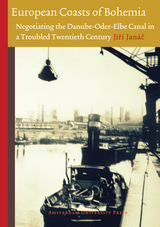
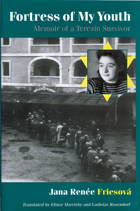
Jana Renée Friesová was fifteen when she was imprisoned by the Nazis in the Czech ghetto town of Terezín. Her memoir tells the poignantly familiar story of a young girl who, even under the most abominable circumstances, engages in intense adolescent friendships, worries with her companions over her looks, and falls in love.
Anne Frank’s diary ends with deportation to a concentration camp; Fortress of My Youth, in contrast, takes the reader deep into the horrors of daily life in a camp that were faced by a young girl and her family. But Friesová also tells of love, joy, sacrifice, and the people who shared in the most profound experiences of her life.
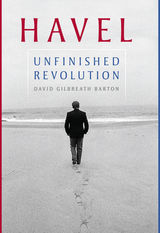
This is the story of a man who tried to resurrect the spirit of democratic life. He was born into a time of chaos and absurdity, and he took it as his fate to carry a candle into the night. This is his story and the story of many others, the writers, artists, actors, and philosophers who took it upon themselves to remember a tradition that had failed so miserably it had almost been forgotten.
Václav Havel (1936–2011), the famous Czech dissident, intellectual, and playwright, was there when a half million people came to Wenceslas Square to demand an end to Communism in 1989. Many came to hear him call for a free Czechoslovakia, for democratic elections, and a return to Europe. The demonstrators roared when he spoke. “Havel to the castle,” they chanted— meaning Havel for president. And a few weeks later, Havel became a most unusual president. He was sometimes misunderstood and not always popular, but by the time of his death in 2011, the world recognized Havel as one of the most prominent figures of the twentieth century.
Born into one of the most prominent and wealthy families in Prague, Havel was the constant subject of attention and an artistic eccentric in a family of businessmen. A young Havel and his family were cast by the Communist takeover as class enemies. Havel traveled a dark road that, ironically, provided the experiences he needed to reconnect not only to his own “ground of being” but to the traditions of civic society. This biography is the story of Havel’s inward journey in his underground years and thus the story of how Havel, the outsider, became the ultimate insider as president of the nation.
In this intimate and sweeping portrayal of Havel, David Barton reveals the eccentricities of the last president of Czechoslovakia, and the first president of the Czech Republic.
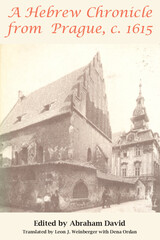
"This slender anonymous work, spanning 1389 to 1611, presents the priorities and concerns of a Jewish community straddling the late medieval and early modern periods. Ample footnotes and explanations provide the lay reader with sufficient background to understand the references to historical events and figures, to ideologies and to institutions. A comprehensive introduction presents the realities of Prague and Bohemia, as well as offering a helpful discussion of the chronicle and other contemporary Jewish accounts."
—Conservative Jewish Quarterly
"In about 1615 an anonymous Jew from Prague composed a short Hebrew chronicle to recount 'the expulsions, miracles, and other occurrences befalling [the Jews] in Prague and the other lands of our long exile.' Abraham David discovered the manuscript [and] added glosses, historical notes, and an introduction. . . . The chronicle, with its brief annual entries, is not a continuous narrative, but does give a feeling of immediacy, like a newspaper."
—Polin: Studies in Polish Jewry
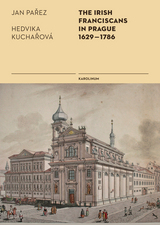
Dealing with a hitherto largely neglected theme, Parez and Kucharová attempt to place the Franciscan College within Bohemian history and to document the activities of its members. This wealth of historical material from the Czech archives, presented in English for the first time, will be of great aid for international researchers, particularly those interested in Bohemia or the Irish diaspora.
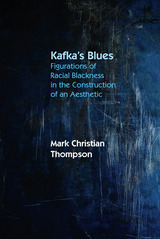
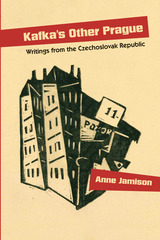
Franz Kafka was born in Prague, a bilingual city in the Habsburg Empire. He died a citizen of Czechoslovakia. Yet Kafka was not Czech in any way he himself would have understood. He could speak Czech, but, like many Prague Jews, he was raised and educated and wrote in German. Kafka critics to date have had little to say about the majority language of his native city or its “minor literature,” as he referred to it in a 1913 journal entry. Kafka’s Other Prague explains why Kafka’s later experience of Czech language and culture matters.
Bringing to light newly available archival material, Anne Jamison’s innovative study demonstrates how Czechoslovakia’s founding and Kafka’s own dramatic political, professional, and personal upheavals altered his relationship to this “other Prague.” It destabilized Kafka’s understanding of nationality, language, gender, and sex—and how all these issues related to his own writing.
Kafka’s Other Prague juxtaposes Kafka’s German-language work with Czechoslovak Prague’s language politics, intellectual currents, and print culture—including the influence of his lover and translator, the journalist Milena Jesenská—and shows how this changed cultural and linguistic landscape transformed one of the great literary minds of the last century.
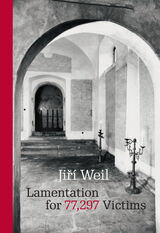
So begins Jiří Weil’s unforgettable prose poem, Lamentation for 77, 297 Victims, his literary monument to the Czech Jews killed during the Holocaust. A Czech-Jewish writer who worked at Prague’s Jewish Museum both during and after the Nazi Occupation—he survived the Holocaust by faking his own death and hiding out until the war had ended—Weil wrote Lamentation while he served as the museum’s senior librarian in the 1950s. This remarkable literary experiment presents a number of innovative approaches to writing about a horror many would deem indescribable, combining a narrative account of the Shoah with newspaper-style reportage on a handful of the lives ended by the Holocaust and quotes from the Hebrew Bible to create a specific and powerful portrait of loss and remembrance. Translated by David Lightfoot, Lamentation for 77,297 Victims is a startling and singular introduction to a writer whose works have been acclaimed by Philip Roth, Michiko Kakutani, and Siri Hustvedt.
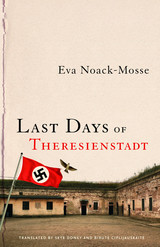
Noack-Mosse's aim in documenting the horrors of daily life within Theresienstadt was to ensure that such a catastrophe could never be repeated. She also gathered from surviving inmates information about earlier events within the walled fortress, witnessed the defeat and departure of the Nazis, saw the arrival of the International Red Cross and the Soviet Army takeover of the camp and town, assisted in administration of the camp's closure, and aided displaced persons in discovering the fates of their family and friends. After the war ended, and she returned home, Noack-Mosse cross-referenced her data with that of others to provide evidence of Nazi crimes. At least 35,000 people died at Theresienstadt and another 90,000 were sent on to death camps.
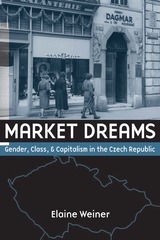
Drawing on a rich trove of focus group data, interviews, and textual sources, Elaine Weiner's Market Dreams powerfully captures the varied responses of female managers and factory workers in the Czech Republic to their country's transition from socialism to capitalism. Her work, rooted in sociology and comparative feminism, is an important advance for the literature on women in Eastern Europe.
"Market Dreams is a conceptually-sophisticated and empirically-rich account of how the discourses and practices of the free market penetrated the hearts and minds of everyday Czech citizens. Weiner's provocative analysis takes readers inside the worlds of female factory workers to expose the discontinuities between their radiant market dreams and their everyday realities--and juxtaposes them to the continuities experienced by female managers. In the process, it challenges many of our ideas about post/socialism, marketization, and gender and reveals the enduring power of stories in shaping social identities and actions."
---Lynne Haney, Associate Professor of Sociology, New York University
"Through interviews and a careful analysis of newspaper articles written in the first decade after the collapse of state socialism, Weiner explores the complicated interconnections between personal stories and the emerging neoliberal metanarrative of the free market in the Czech Republic after 1989. Her book transcends many of the dichotomies with which researchers of post-state socialism have been struggling: 'East' vs. 'West,' losers and winners, emancipation vs. oppression, etc., and thus makes a truly novel contribution to our understanding of women's lives after state socialism."
---Éva Fodor, Assistant Professor of Gender Studies, Central European University
"Weiner's rich and innovative study of female Czech managers and workers exemplifies the importance of narrative analysis for understanding why gender and class have not (yet) reconfigured the sense of postcommunism's alternatives. This is critical reading for feminists, class analysts, and students of postcommunist social change."
---Michael Kennedy, Director, Center for European Studies, University of Michigan
Elaine Weiner is Assistant Professor of Sociology at McGill University. Visit the author's website at: www.mcgill.ca/sociology/faculty/weiner/.
Cover Credit: Frank Scherschel/Time & Life Pictures/Getty Images
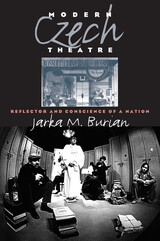
The story of Czech theatre in the twentieth century involves generations of mesmerizing players and memorable productions. Beyond these artistic considerations, however, lies a larger story: a theatre that has resonated with the intense concerns of its audiences acquires a significance and a force beyond anything created by striking individual talents or random stage hits. Amid the variety of performances during the past hundred years, that basic and provocative reality has been repeatedly demonstrated, as Jarka Burian reveals in his extraordinary history of the dramatic world of Czech theatre.
Following a brief historical background, Burian provides a chronological series of perspectives and observations on the evolving nature of Czech theatre productions during this century in relation to their similarly evolving social and political contexts. Once Czechoslovak independence was achieved in 1918, a repeated interplay of theatre with political realities became the norm, sometimes stifling the creative urge but often producing even greater artistry. When playwright Václav Havel became president in 1990, this was but the latest and most celebrated example of the vital engagement between stage and society that has been a repeated condition of Czech theatre for the past two hundred years. In Jarka Burian's skillful hands, Modern Czech Theatre becomes an extremely important touchstone for understanding the history of modern theatre within western culture.
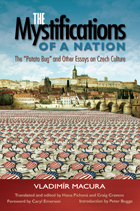
A keen observer of culture, Czech writer Vladimír Macura (1945–99) devoted a lifetime to illuminating the myths that defined his nation. The Mystifications of a Nation, the first book-length translation of Macura’s work in English, offers essays deftly analyzing a variety of cultural phenomena that originate, Macura argues, in the “big bang” of the nineteenth-century Czech National Revival, with its celebration of a uniquely Czech identity.
In reflections on two centuries of Czech history, he ponders the symbolism in daily life. Bridges, for example—once a force of civilization connecting diverse peoples—became a sign of destruction in World War I. Turning to the Soviet and post-Soviet eras, Macura probes a range of richly symbolic practices, from the naming of the Prague metro system, to the mass gymnastic displays of the Communist period, to post–Velvet Revolution preoccupations with the national anthem. In “The Potato Bug,” he muses on one of the stranger moments in the Cold War—the claim that the United States was deliberately dropping insects from airplanes to wreak havoc on the crops of Czechoslovakia.
While attending to the distinctively Czech elements of such phenomena, Macura reveals the larger patterns of Soviet-brand socialism. “We were its cocreators,” he declares, “and its analysis touches us as a scalpel turned on its own body.” Writing with erudition, irony, and wit, Macura turns the scalpel on the authoritarian state around him, demythologizing its mythology.
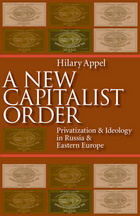
After the collapse of communism in the Soviet Union and eastern Europe, more than a dozen countries undertook aggressive privatization programs. Proponents of economic reform championed such large-scale efforts as the fastest, most reliable way to make the transition from a state-run to a capitalist economy.
The idea was widely embraced, and in the span of a few years, policymakers across the region repeatedly chose an approach that distributed vast amounts of state property to the private sector essentially for free-despite the absence of any historical precedent for such a radical concept. But privatization was not a panacea. It has, instead, become increasingly synonymous with collusion, corruption, and material deprivation.
Why was privatization so popular in the first place, and what went wrong? In answering this question, Hillary Appel breaks with mainstream empirical studies of postcommunist privatization.
By analyzing the design and development of programs in Russia, the Czech Republic, and across eastern Europe, Appel demonstrates how the transformation of property rights in these countries was first and foremost an ideologically driven process. Looking beyond simple economic calculations or pressure from the international community, she argues that privatization was part and parcel of the foundation of the postcommunist state.
A New Capitalist Order reveals that privatization was designed and implemented by pro-market reformers not only to distribute gains and losses to powerful supporters, but also to advance a decidedly Western, liberal vision of the new postcommunist state. Moreover, specific ideologies-such as anticommunism, liberalism, or nationalism, to name but a few-profoundly influenced the legitimacy, the power, and even the material preferences of key economic actors and groups within the privatization process.
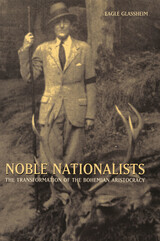
This illuminating study examines the dramatic transformation of Bohemian noble identity from the rise of mass politics in the late nineteenth century to the descent of the Iron Curtain after World War II.
At the turn of the twentieth century, some 300 noble families owned over a third of the Habsburg Bohemian Crownlands. With the Empire's demise in 1918, the once powerful Bohemian nobility quickly became a target of the nationalist revolution sweeping the new Czechoslovak state. Eagle Glassheim traces the evolving efforts of the nobles to define their place in this revolutionary new order.
Nobles saw little choice but to ally with Czech and German national parties, initially in the hopes of assuaging radical land reform. Yet they retained aristocratic political and social traditions that continued to shape their national identities after 1918. Some moved toward a hybrid national identification, embracing a form of German internationalism and a vision of pan-European unity that led many to support Hitler's expansionist efforts in the late 1930s. Others trumpeted their new-found Czech nationalism in resisting the Nazi occupation.
Noble Nationalists offers valuable insights on the nationalization of a conservative political elite, as well as on the national and social revolutions that recast Central Europe in the first half of the twentieth century.
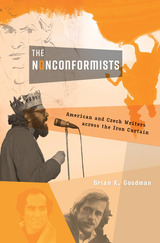
How risky encounters between American and Czech writers behind the Iron Curtain shaped the art and politics of the Cold War and helped define an era of dissent.
“In some indescribable way, we are each other’s continuation,” Arthur Miller wrote of the imprisoned Czech playwright Václav Havel. After a Soviet-led invasion ended the Prague Spring, many US-based writers experienced a similar shock of solidarity. Brian Goodman examines the surprising and consequential connections between American and Czech literary cultures during the Cold War—connections that influenced art and politics on both sides of the Iron Curtain.
American writers had long been attracted to Prague, a city they associated with the spectral figure of Franz Kafka. Goodman reconstructs the Czech journeys of Allen Ginsberg, Philip Roth, and John Updike, as well as their friendships with nonconformists like Havel, Josef Škvorecký, Ivan Klíma, and Milan Kundera. Czechoslovakia, meanwhile, was home to a literary counterculture shaped by years of engagement with American sources, from Moby-Dick and the Beats to Dixieland jazz and rock ’n’ roll. Czechs eagerly followed cultural trends in the United States, creatively appropriating works by authors like Langston Hughes and Ernest Hemingway, sometimes at considerable risk to themselves.
The Nonconformists tells the story of a group of writers who crossed boundaries of language and politics, rearranging them in the process. The transnational circulation of literature played an important role in the formation of new subcultures and reading publics, reshaping political imaginations and transforming the city of Kafka into a global capital of dissent. From the postwar dream of a “Czechoslovak road to socialism” to the neoconservative embrace of Eastern bloc dissidence on the eve of the Velvet Revolution, history was changed by a collision of literary cultures.

How is it that Czechoslovakia’s separation into two countries in 1993 was accomplished so peacefully—especially when compared with the experiences of its neighbors Russia and Yugoslavia? This book provides a sociological answer to this question—and an empirical explanation for the breakup of Czechoslovakia—by tracing the political processes begun in the Prague Spring of 1968.
Gil Eyal’s main argument is that Czechoslovakia’s breakup was caused by a struggle between two fractions of what sociologists call the “new class,” which consisted primarily of intellectuals and technocrats. Focusing on the process of polarization that created these two distinct political elites, Eyal shows how, in response to the events of the ill-fated Prague Spring, Czech and Slovak members of the “new class” embarked on divergent paths and developed radically different, even opposed, identities, worldviews, and interests. Unlike most accounts of postcommunist nationalist conflict, this book suggests that what bound together each of these fractions—and what differentiated each from the other—were not national identities and nationalist sentiments per se, but their distinctive visions of the social role of intellectuals.
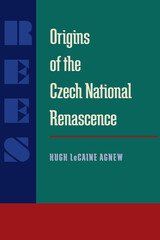
Hugh Agnew develops the argument that Czechoslovakia's celebrated national revival of the mid-eighteenth century has its intellectual roots in the Enlightenment and defined the nation's character and future development. He describes how intellectuals in eighteenth-century Bohemia and Moravia--the “patriotic intelligentsia”--used their discovery of pre-seventeenth-century history and literature to revive the antiquated Czech vernacular and cultivate a popular ethnic consciousness. Agnew also traces the significance of the intellectual influences of the wider Slavic world whereby Czech intellectuals redefined their ethnic and cultural heritage.
Origins of the Czech National Renascence contributes to a renewed interpretation of a crucial period in Czech history.
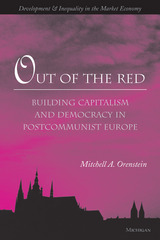
A detailed analysis of Poland and the Czech Republic suggests that alternation between strategies has been the secret to the success of East-Central European countries.
This comparative case analysis identifies the significance of reform mistakes during transition and the corrective benefits of policy alternation, its claims illustrated with an in-depth study of privatization policy in the two countries.
Mitchell A. Orenstein delves into the historic struggle to build capitalism and democracy during a decade of post- communist transition in East-Central Europe and develops a model that explains why democratic policy alternation may accelerate policy learning under conditions of uncertainty and constraint.
Out of the Red is accessible to a general audience and as such is suitable for both graduate and undergraduate courses on political economy. It will be of particular interest to economists, political scientists, sociologists, students of postcommunism, and anyone interested in the relations between capitalism and democracy in the contemporary world.
Mitchell A. Orenstein is Assistant Professor of Political Science, Syracuse University.
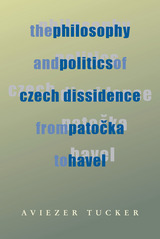
A critical study of the philosophy and political practice of the Czech dissident movement Charter 77. Aviezer Tucker examines how the political philosophy of Jan Patocka (1907–1977), founder of Charter 77, influenced the thinking and political leadership of Vaclav Havel as dissident and president.
Presents the first serious treatment of Havel as philosopher and Patocka as a political thinker. Through the Charter 77 dissident movement in Czechoslovakia, opponents of communism based their civil struggle for human rights on philosophic foundations, and members of the Charter 77 later led the Velvet Revolution. After Patocka’s self-sacrifice in 1977, Vaclav Havel emerged a strong philosophical and political force, and he continued to apply Patocka’s philosophy in order to understand the human condition under late communism and the meaning of dissidence. However, the political/philosophical orientation of the Charter 77 movement failed to provide President Havel with an adequate basis for comprehending and responding to the extraordinary political and economic problems of the postcommunist period.
In his discussion of Havel's presidency and the eventual corruption of the Velvet Revolution, Tucker demonstrates that the weaknesses in Charter 77 member's understanding of modernity, which did not matter while they were dissidents, seriously harmed their ability to function in a modern democratic system. Within this context, Tucker also examines Havel’s recent attempt to topple the democratic but corrupt government in 1997–1998. The Philosophy and Politics of Czech Dissidence from Patocka to Havel will be of interest to students of philosophy and politics, scholars and students of Slavic studies, and historians, as well as anyone fascinated by the nature of dissidence.
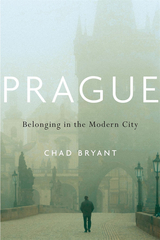
A poignant reflection on alienation and belonging, told through the lives of five remarkable people who struggled against nationalism and intolerance in one of Europe’s most stunning cities.
What does it mean to belong somewhere? For many of Prague’s inhabitants, belonging has been linked to the nation, embodied in the capital city. Grandiose medieval buildings and monuments to national heroes boast of a glorious, shared history. Past governments, democratic and Communist, layered the city with architecture that melded politics and nationhood. Not all inhabitants, however, felt included in these efforts to nurture national belonging. Socialists, dissidents, Jews, Germans, and Vietnamese—all have been subject to hatred and political persecution in the city they called home.
Chad Bryant tells the stories of five marginalized individuals who, over the last two centuries, forged their own notions of belonging in one of Europe’s great cities. An aspiring guidebook writer, a German-speaking newspaperman, a Bolshevik carpenter, an actress of mixed heritage who came of age during the Communist terror, and a Czech-speaking Vietnamese blogger: none of them is famous, but their lives are revealing. They speak to tensions between exclusionary nationalism and on-the-ground diversity. In their struggles against alienation and dislocation, they forged alternative communities in cafes, workplaces, and online. While strolling park paths, joining political marches, or writing about their lives, these outsiders came to embody a city that, on its surface, was built for others.
A powerful and creative meditation on place and nation, the individual and community, Prague envisions how cohesion and difference might coexist as it acknowledges a need common to all.
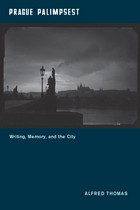
A city of immense literary mystique, Prague has inspired writers across the centuries with its beauty, cosmopolitanism, and tragic history. Envisioning the ancient city in central Europe as a multilayered text, or palimpsest, that has been constantly revised and rewritten—from the medieval and Renaissance chroniclers who legitimized the city’s foundational origins to the modernists of the early twentieth century who established its reputation as the new capital of the avant-garde—Alfred Thomas argues that Prague has become a paradoxical site of inscription and effacement, of memory and forgetting, a utopian link to the prewar and pre-Holocaust European past and a dystopia of totalitarian amnesia.
Considering a wide range of writers, including the city’s most famous son, Franz Kafka, Prague Palimpsest reassesses the work of poets and novelists such as Bohumil Hrabal, Milan Kundera, Gustav Meyrink, Jan Neruda, Vítĕzslav Nezval, and Rainer Maria Rilke and engages with other famous authors who “wrote” Prague, including Guillaume Apollinaire, Ingeborg Bachmann, Albert Camus, Paul Celan, and W. G. Sebald. The result is a comparative, interdisciplinary study that helps to explain why Prague—more than any other major European city—has haunted the cultural and political imagination of the West.
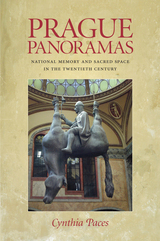
The Czechs struggled to define their national identity throughout the modern era. Prague, the capital of a diverse area comprising Czechs, Slovaks, Germans, Poles, Ruthenians, and Romany as well as various religious groups including Catholics, Protestants, and Jews, became central to the Czech domination of the region and its identity. These struggles have often played out in violent acts, such as the destruction of religious monuments, or the forced segregation and near extermination of Jews.
During the twentieth century, Prague grew increasingly secular, yet leaders continued to look to religious figures such as Jan Hus and Saint Wenceslas as symbols of Czech heritage. Hus, in particular, became a paladin in the struggle for Czech independence from the Habsburg Empire and Austrian Catholicism.
Through her extensive archival research and personal fieldwork, Cynthia Paces offers a panoramic view of Prague as the cradle of Czech national identity, seen through a vast array of memory sites and objects. From the Gothic Saint Vitus Cathedral, to the Communist Party's reconstruction of Jan Hus's Bethlehem Chapel, to the 1969 self-immolation of student Jan Palach in protest of Soviet occupation, to the Hosková plaque commemorating the deportation of Jews from Josefov during the Holocaust, Paces reveals the iconography intrinsic to forming a collective memory and the meaning of being a Czech. As her study discerns, that meaning has yet to be clearly defined, and the search for identity continues today.
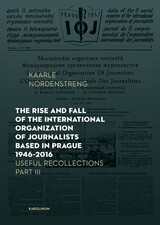

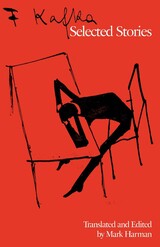
A superb new translation of Kafka’s classic stories, authoritatively annotated and beautifully illustrated.
Selected Stories presents new, exquisite renderings of short works by one of the indisputable masters of the form. Award-winning translator and scholar Mark Harman offers the most sensitive English rendering yet of Franz Kafka’s unique German prose—terse, witty, laden with ambiguities and double meanings. With his in-depth biographical introduction and notes illuminating the stories and placing them in context, Harman breathes new life into masterpieces that have often been misunderstood.
Included are sixteen stories, arranged chronologically to convey a sense of Kafka’s artistic development. Some, like “The Judgment,” “In the Penal Colony,” “A Hunger Artist,” and “The Transformation” (usually, though misleadingly, translated as “The Metamorphosis”), represent the pinnacle of Kafka’s achievement. Accompanying annotations highlight the wordplay and cultural allusions of the original German, pregnant with irony and humor that English readers have often missed.
Although Kafka has frequently been cast as a loner, in part because of his quintessential depictions of modern alienation, he had a number of close companions. Harman draws on Kafka’s diaries, extensive correspondence, and engagement with early twentieth-century debates about Darwinism, psychoanalysis, and Zionism to construct a rich portrait of Kafka in his world. A work of both art and scholarship, Selected Stories transforms our understanding and appreciation of a singular imagination.

Seven Days to the Funeral is the fictionalized memoir of Ján Rozner, a leading Slovak journalist, critic, dramaturg, and translator. Rozner and his wife Zora Jesenská were champions of the Prague Spring and were blacklisted after the Soviet-led invasion of Czechoslovakia in 1968. When Jesenská died in 1972, her funeral became a political event and attendees faced recriminations.
A painstaking account of the week after his wife’s death, Seven Days to the Funeral is a historical record of the devastating impact of the period after the invasion. Through ruthless portraits of key figures in Slovak culture, the book provides a fascinating cultural history of Slovakia from 1945 to 1972. It is also a moving love story of an unlikely couple. Although Rozner began the book in 1976, it was left unfinished upon his death. The book was published posthumously in 2009 by his second wife Sláva Roznerová.
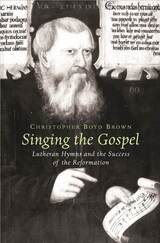
Singing the Gospel offers a new appraisal of the Reformation and its popular appeal, based on the place of German hymns in the sixteenth-century press and in the lives of early Lutherans. The Bohemian mining town of Joachimsthal--where pastors, musicians, and laity forged an enduring and influential union of Lutheranism, music, and culture--is at the center of the story.
The Lutheran hymns, sung in the streets and homes as well as in the churches and schools of Joachimsthal, were central instruments of a Lutheran pedagogy that sought to convey the Gospel to lay men and women in a form that they could remember and apply for themselves. Townspeople and miners sang the hymns at home, as they taught their children, counseled one another, and consoled themselves when death came near.
Shaped and nourished by the theology of the hymns, the laity of Joachimsthal maintained this Lutheran piety in their homes for a generation after Evangelical pastors had been expelled, finally choosing emigration over submission to the Counter-Reformation. Singing the Gospel challenges the prevailing view that Lutheranism failed to transform the homes and hearts of sixteenth-century Germany.

In this volume, an international and interdisciplinary team of scholars—Czech and American archaeologists, paleoanthropologists, geologists, and biologists—report on the results of the investigations from 1980 through the 1990s at Stránská skála, a complex of open-air loess sites on the outskirts of the Brno Basin in the Czech Republic.
The volume presents in-depth studies of the geology, paleopedology, frost processes, vegetation, fauna, and archaeological features of Stránská skála that break new ground in our understanding of early modern humans in central Europe.

Trained in philosophy and medicine, the writer, translator, scholar, and political and cultural activist Siegfried Kapper (1821–1879) devoted significant effort to the advancement of Jewish culture in Bohemia, Jewish emancipation, and to the commitment of Jews to contemporary Czech society. The three stories in this collection, which first appeared in the press in the 1840s and were posthumously published as a collection at the end of the century, offer a Romantic and folkloric vision of Jewish culture in Prague.
The first story, “Genenda,” displays Kapper’s operatic eye for detail and drama with its account of a dutiful rabbi’s daughter being swept away by a dashing young man, a Christian nobleman disguised as a Jew. “The Curious Guest” is an intricate tale of a quest for wisdom and power. The final story, “Glowing Coals,” is a supernatural tale of romantic desire and revenge, displaying Kapper’s skill at deploying the tropes of folklore for dramatic literary effect. The collection not only provides a colorful snapshot of nineteenth-century Czech-Jewish culture but also resonates with universal human themes that transcend a single national experience.
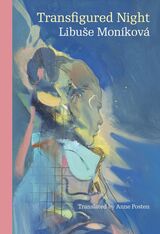
In late 1992, three years after the Velvet Revolution and as Czechoslovakia is about to dissolve into the Czech Republic and Slovakia, choreographer and dancer Leonora Marty, who fled the Communist state decades earlier, has returned to Prague. Having wrapped up her ballet of The Makropulos Affair, the famous dancer meets old classmates, wanders the city through crowds of tourists, and visits the most obscure and unvisited museums. When she is approached by Thomas Asperger, a descendant of ethnic Germans driven from Czechoslovakia after World War II, she must confront three relationships—her relationship with the city of her youth, her homeland’s relationship with its past, and her new romance with this German admirer.
Written in German and published in 1995, by an author whose life mirrored her protagonist’s, the novel provides a cultural tour of Prague. Employing a style as influenced by the operas of Leoš Janácek as the novels of Thomas Pynchon, Transfigured Night is a masterpiece of Czech literature, showing that the culture of this nation comes in a variety of tongues.
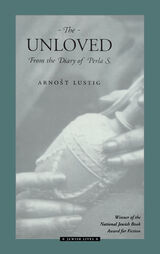
Perla S. is a beautiful seventeen-year-old girl who, while interred in the Theresienstadt concentration camp, becomes a prostitute. Capturing Perla's voice through a series of diary entries, Arnost Lustig shows how she maintains her integrity, honesty, and hope amidst lies and horror. This first paperback edition has been extensively revised and expanded by the author.
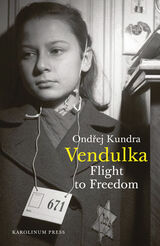
Famed Czech photographer Jan Lukas snapped an offhand portrait of twelve-year-old Vendulka Vogl in March 1943. A friend of the Vogls, Lukas was saying goodbye to the family, who were soon to leave Prague for a concentration camp. The photograph almost didn’t see the light of day—Lukas knew that if the Nazis found it on him, he could wind up in the camps as well—but the image was eventually developed and came to symbolize the Holocaust and humanize its victims. Seventy years after this famous picture was taken, investigative journalist Ondřej Kundra discovered that, despite all odds, Vendulka Vogl had survived the camps of Terezín, Auschwitz, and Christianstadt, and was in fact still alive and living in the United States. Kundra persuaded her to tell the remarkable story surrounding the photograph: her survival, her later decision to flee the Communist regime for America, and how she later reconnected with Jan Lukas, maintaining a lifelong friendship.
Vogl’s thrillingly moving story, Kundra’s sharp and engaging writing, and Lukas’s striking photography all combine to make Vendulka an inspiring investigation into the horrors of totalitarianism and the redemptive beauty of friendship.
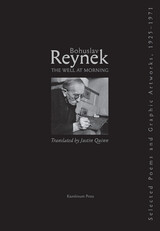
A chaffinch in a tree
of cherry sings merrily
spring’s introit.
Its blazing bobble dwells
in leaves, alive, and swells
in scarlet.
The flowers are flares of white.
The chaffinch has gone quiet
and turned sky-gazer.
My eyes close on the day:
an orb revolves in grey
and red and azure.
Poet and artist Bohuslav Reynek spent most of his life in the relative obscurity of the Czech-Moravian Highlands; although he suffered at the hands of the Communist regime, he cannot be numbered among the dissident poets of Eastern Europe who won acclaim for their political poetry in the second half of the twentieth century. Rather, Reynek belongs to an older pastoral-devotional tradition—a kindred spirit to the likes of English-language poets Gerard Manley Hopkins, William Wordsworth, Robert Frost, and Edward Thomas. The Well at Morning presents a selection of poems from across his life and is illustrated with twenty-five of his own color etchings. Also featuring three essays by leading scholars that place Reynek’s life and work alongside those of his better-known peers, this book presents a noted Czech artist to the wider world, reshaping and amplifying our understanding of modern European poetry.
READERS
Browse our collection.
PUBLISHERS
See BiblioVault's publisher services.
STUDENT SERVICES
Files for college accessibility offices.
UChicago Accessibility Resources
home | accessibility | search | about | contact us
BiblioVault ® 2001 - 2024
The University of Chicago Press









